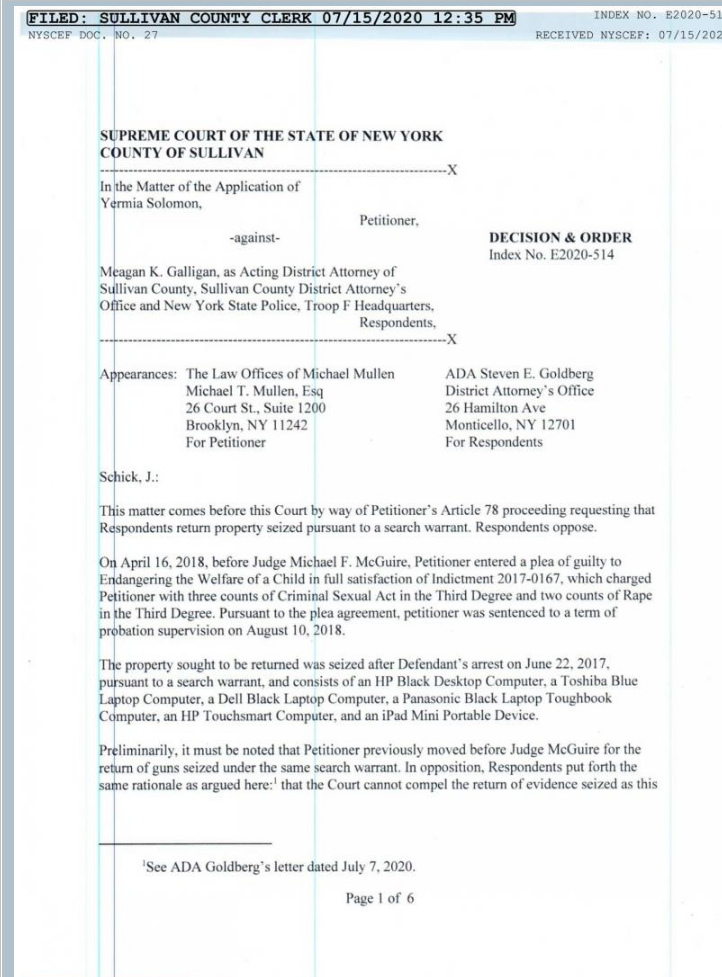SCHICK ORDERS DA'S OFFICE TO RETURN 6 PERSONAL COMPUTERS OWNED BY YERMIA SOLOMON
- Rich Klein

- Jul 21, 2020
- 3 min read
MONTICELLO - State Supreme Court Justice Stephan Schick last Wednesday ordered that six computers owned by former Village of Monticello Police Officer Yermia "Jeremy" Solomon that have been in the custody of the Sullivan County District Attorney's Office since June 2017 be returned to him by the end of this week.
On April 16, 2018, Solomon plead guilty to a Class A misdemeanor for endangering the welfare of a child (engaging in oral sex with a minor) and resigned from the police department. Former District Attorney Jim Farrell recommended three years of probation as part of the agreement. A charge of third degree rape was dropped as part of the agreement. He did not have to register as a sex offender.
In his decision, Schick cited a New York Court of Appeals decision in DeBellis v Property Clerk of New York:
“The core principle...is that, although the government may seize and hold a citizen’s property for a variety of reasons in connection with a criminal or related proceeding, once those proceedings have terminated or it is determined that the property is not related to or is otherwise not needed for those proceedings,due process requires that the property be returned upon demand unless the government can establish a new basis for detention.”
Michael Mullen, the attorney who represented Solomon in the case, said that as of 10 am today (Tuesday, July 21), the computers had not yet been returned. Schick ordered that the DA's office return the property no later than 10 days from July 15.
"Judge Schick called it for what it is," Mullen said in a phone interview with The SullivanTimes. "In my opinion and in the judge's opinion, this was a complete overreach by the DA's office. It's a question of upholding the law. The DA's office should not be able to keep indefinitely personal property of a defendant after an arrest and a conviction, regardless of what that defendant's job was at the time of the arrest. Especially when nothing contained on the personal property is evidence or has evidence of a crime. It was punitive towards Jeremy."
Mullen added that, in his decade as an attorney that included time as a former prosecutor, "I've never had to jump through hoops like this to get property back. "
"Once they got search warrants and realized there wasn't any contraband or evidence of any criminal activity, they should have returned it at that point," he said. "There's no legitimate basis that law enforcement should keep anyone's personal property. Ultimately, I think Judge Schick saw that this is not just about Jeremy Solomon ...this is about other people in the community who are arrested. "
The SullivanTimes this morning reached out to Galligan by email for comment on the decision.
In his decision, Schick cited a July 7, 2020 letter from the Acting DA's Office in which Galligan said that there was evidence of electronic communications with the victim in the action.
Schick held that "the letter does not that state that such electronic communications was evidence pertaining to the crimes within the indictment. "
He added: "However, Respondents failed to file affidavits or other written proof substantiating the hearsay allegations with the letter, as required by CPLR 7804 (e), even after the Court provided them with repeated opportunities to cure the defect. Nor did the Respondents provide an attorney's affirmation under CPLR 2106 to attempt to cure the hearsay within the untimely Jul 7 letter. "
Solomon alleged in the "verified petition to compel return of seized property" (filed in March) that six computer items remain with law enforcement, including a desktop computer and three laptops.
Firearms belonging to Solomon were ordered returned after a January 22, 2019 decision by County Court Judge Michael McGuire.











Comments